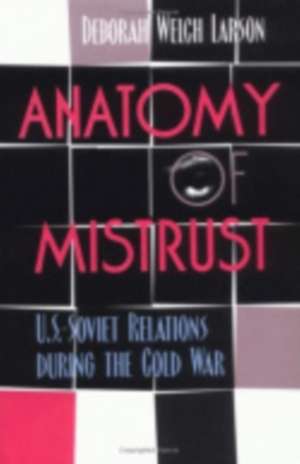Anatomy of Mistrust – U.S.–Soviet Relations during the Cold War: Cornell Studies in Security Affairs
Autor Deborah Welch Larsonen Limba Engleză Hardback – 23 apr 1997
Synthesizing different understandings of trust and mistrust from the theoretical traditions of economics, psychology, and game theory, Larson analyzes five cases that might have been turning points in U.S.-Soviet relations: the two-year period following Stalin's death in 1953; Khrushchev's peace offensive from the launching of Sputnik until the U-2 incident; the Kennedy administration; the Nixon-Brezhnev detente; and the Gorbachev period. Larson concludes that leaders in the United States often refused to accept Soviet offers to negotiate because they feared a trap. Mutual trust is necessary, she concludes, although it may not be sufficient, for states to cooperate in managing their security.
Din seria Cornell Studies in Security Affairs
-
 Preț: 254.66 lei
Preț: 254.66 lei -
 Preț: 287.01 lei
Preț: 287.01 lei -
 Preț: 115.88 lei
Preț: 115.88 lei -
 Preț: 155.47 lei
Preț: 155.47 lei -
 Preț: 248.19 lei
Preț: 248.19 lei -
 Preț: 163.94 lei
Preț: 163.94 lei -
 Preț: 141.33 lei
Preț: 141.33 lei -
 Preț: 116.92 lei
Preț: 116.92 lei -
 Preț: 147.82 lei
Preț: 147.82 lei -
 Preț: 140.64 lei
Preț: 140.64 lei -
 Preț: 145.90 lei
Preț: 145.90 lei -
 Preț: 159.62 lei
Preț: 159.62 lei -
 Preț: 147.84 lei
Preț: 147.84 lei -
 Preț: 154.39 lei
Preț: 154.39 lei -
 Preț: 136.31 lei
Preț: 136.31 lei -
 Preț: 121.64 lei
Preț: 121.64 lei -
 Preț: 215.06 lei
Preț: 215.06 lei -
 Preț: 341.43 lei
Preț: 341.43 lei -
 Preț: 166.80 lei
Preț: 166.80 lei -
 Preț: 143.72 lei
Preț: 143.72 lei -
 Preț: 181.67 lei
Preț: 181.67 lei -
 Preț: 326.45 lei
Preț: 326.45 lei -
 Preț: 133.63 lei
Preț: 133.63 lei -
 Preț: 247.92 lei
Preț: 247.92 lei -
 Preț: 339.49 lei
Preț: 339.49 lei -
 Preț: 146.59 lei
Preț: 146.59 lei -
 Preț: 164.13 lei
Preț: 164.13 lei -
 Preț: 155.26 lei
Preț: 155.26 lei -
 Preț: 258.54 lei
Preț: 258.54 lei -
 Preț: 309.71 lei
Preț: 309.71 lei -
 Preț: 233.12 lei
Preț: 233.12 lei -
 Preț: 283.94 lei
Preț: 283.94 lei -
 Preț: 317.55 lei
Preț: 317.55 lei -
 Preț: 155.58 lei
Preț: 155.58 lei -
 Preț: 232.20 lei
Preț: 232.20 lei -
 Preț: 153.84 lei
Preț: 153.84 lei
Preț: 452.42 lei
Nou
Puncte Express: 679
Preț estimativ în valută:
86.57€ • 90.62$ • 72.05£
86.57€ • 90.62$ • 72.05£
Carte tipărită la comandă
Livrare economică 31 martie-14 aprilie
Preluare comenzi: 021 569.72.76
Specificații
ISBN-13: 9780801433023
ISBN-10: 0801433029
Pagini: 352
Dimensiuni: 155 x 235 x 28 mm
Greutate: 0.64 kg
Editura: MB – Cornell University Press
Seria Cornell Studies in Security Affairs
ISBN-10: 0801433029
Pagini: 352
Dimensiuni: 155 x 235 x 28 mm
Greutate: 0.64 kg
Editura: MB – Cornell University Press
Seria Cornell Studies in Security Affairs
Descriere
Synthesizing different understandings of trust and mistrust from the theoretical traditions of economics, psychology, and game theory, Larson analyzes five cases that might have been turning points in U.S.-Soviet relations.
